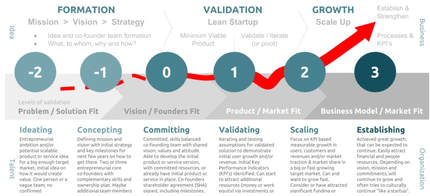|
Following a discussion of an entrepreneur that was lacking the right idea, we came across a post where an entrepreneur was asking the community for startup ideas he could consider for his first startup venture. He quite simply wasn’t able to come up with anything that he could be that passionate enough about to pursue. What’s fascinating, but not surprising, is the community replied with ideas they came up with which could become his next startup venture! We say ‘fascinating’ because some years ago this would have been a joke. How can someone ask for innovative startup ideas expecting people to share them when these ideas could be worth millions right? We say ‘not surprising’ because attitudes towards ideas have changed and in this highly networked and collaborative world we live in connected by the web, more people realize it’s not just about ideas, but what you can build on top of them that really counts in business. This is happening also because entrepreneurship education is taken more seriously nowadays. “Ideas” are separate from “execution” just as open source software is different from running a business using open source software. Take the concept of cloud computing for example. The hardware and resources and the concept are not only shared, but developed to allow for collaboration and co-creation of solutions and businesses on top of what exists to provide people with something more. In today’s environment, ideas, concepts, business models and even software are universally shared and available it’s more about who builds business (or something else) on top of them. While many traditional businessmen and entrepreneurs still worry about the security of “ideas” when it comes to crowdfunding or working within a community like Startup Commons, the paradigm shift in how innovation is happening and new startups are born has already begun and keeping ideas close to one’s chest is not a part of that changing trend. How many startups can you name where the idea alone was the key driver of their success? That they had to keep the idea secret and it would be truly impossible for more established actors to steal? You are probably drawing a blank here. Also as entrepreneurs should fall in love with their ideas, in order to be able to commit several years to their venture – how many entrepreneurs fall in love with other people’s ideas? Commitment is the start of the venture and if cracks appear in the commitment, it will show along the way regardless of what type of patchwork you employ to cover the cracks. It takes more than one man with an idea to make things work and build successful startups which is why building on it with the right people becomes paramount. So before we cling on to the notion that publishing an idea is the end of your possible venture remember: Being a startup is nothing else than being an architect in using existing ideas, concepts and software “legos” to solve existing market and customer problems with a great team. Building value relies on the execution and funding can be one of the enabling forces. The idea is only the beginning. Startup Commons has released entire Growth Academy innovation entrepreneurship curriculum training materials with more than 700+ slides, along with supporting booklets for free co-development and use.
All is released under Creative Commons licensing and in editable format. The curriculum is built, designed and refined over the years to increase the volume of entrepreneurship and likelihood of startup success by focusing on removing or reducing the biggest “universal risks” and to educate about optimal methods and structures. To give more support during learning process and to train future coaches, we created a serie of training webinars and certification programs. “Who are your main competitors?” How many times have you heard an entrepreneur tell you that “there is no competition” and that they are alone in the entire, vast market? It’s not uncommon that entrepreneurs, especially first time ones without strong entrepreneurship education, have a rosier picture of the world than the intense reality that exists. And it is even natural that as entrepreneurs have to build themselves up, boost their own confidence, it might get translated into some of the less fortunate avenues. Why is this an issue? First of all, whenever any experienced individual hears the words “no competition” and other expressions like it, it sets off alarm bells. No competition means no market, right? Or at the very least it means that the entrepreneur hasn’t realized who their competition is at the moment and who they will be down the line. But not to pick on this one case, but rather outline a broader issue of misplaced optimism. The case of competition is just one topic, but there are many other ‘little things’ that raise red flags. There are seldom startup cases where something is unique, even though the entrepreneurs would gladly see it that way. Having an idea is great, it would be awful if people didn’t have ideas, but an idea alone is worth nothing. Execution and putting your money where your mouth is, commitment to building your venture and attracting others to join you, that’s already worth something. However rest assured you will be challenged on the journey to the top. Especially as you get to a certain point, build significant interest around you, even turn away investors and get just the right investor on board, it’s easy to fall complacent and think it will get easier. True, some things will get easier, but some things will get a lot more complicated. With entrepreneurship, it’s never over. It’s easy to think, that when I do A, B and C, then we will be successful and the stormy seas will settle down. Truth be told, sometimes that thinking is what saves the day, but in the long term that will be a fallacy that might drive one nuts. And pretending that the ride will not be bumpy, might quickly prove dangerous with more stakeholders in the venture. Entrepreneurs should always be conscious of the signals they are sending to different stakeholders, since it will affect expectations of those working with you in whatever capacity. If the expectations are not met, it will create problems explicitly and implicitly. How to solve these problems is one part, but planning for the bumpy ride and communicating it to the team behind the venture may be an instrument to keep eyes open and defuse ugly situations ahead of time. There are problems when you have no money, but there are more problems when you have a lot of money. Naturally the problems present themselves in different stages of startup ventures and are of various different characteristics, but the challenges an entrepreneur faces are the core part of entrepreneurship and doing something new. The sooner you realize that it’s not the sunny day once a year that you should look forward to, but rather learn to enjoy the storm, the sooner you’ll build a sustainable model for handling the needed growth. After all, entrepreneurs are a crazy bunch. If you want to increase the likelihood of startup success by focusing on reducing the biggest universal risks on the journey, check out our digital knowledge library: |
Supporting startup ecosystem development, from entrepreneurship education, to consulting to digital infrastructure for connecting, measuring and international benchmarking.
Subscribe for updates
Startup ecosystem development updates with news, tips and case studies from cities around the world. Join Us?Are you interested to join our global venture to help develop startup ecosystems around the world?
Learn more... Archives
December 2023
Categories
All
|
- Startup Commons
- Business Creators
-
Support Providers
- About Support Providers
- Learn About Startup Ecosystem
- Startup Development Phases
- Providing Support Functions
- Innovation Entrepreneurship Education
- Innovation Entrepreneurship Curriculum
- Growth Academy eLearning Platform
- Certified Trainers
- Become Growth Academy Provider In Your Ecosystem
- Growth Academy Training On-Site By Startup Commons
-
Ecosystem Development
- About Ecosystem Developers
- What Is Startup Ecosystem
- Ecosystem Development
- Ecosystem Development Academy eLearning Platform
- Subscribe to Support Membership
- Ecosystem Operators
- Development Funding
- For Development Financiers
- Startup Ecosystem Maturity
- Case Studies
- Submit Marketplace App Challenge
- Become Ecosystem Operator
- Digital Transformation
- Contact Us
- Startup Commons
- Business Creators
-
Support Providers
- About Support Providers
- Learn About Startup Ecosystem
- Startup Development Phases
- Providing Support Functions
- Innovation Entrepreneurship Education
- Innovation Entrepreneurship Curriculum
- Growth Academy eLearning Platform
- Certified Trainers
- Become Growth Academy Provider In Your Ecosystem
- Growth Academy Training On-Site By Startup Commons
-
Ecosystem Development
- About Ecosystem Developers
- What Is Startup Ecosystem
- Ecosystem Development
- Ecosystem Development Academy eLearning Platform
- Subscribe to Support Membership
- Ecosystem Operators
- Development Funding
- For Development Financiers
- Startup Ecosystem Maturity
- Case Studies
- Submit Marketplace App Challenge
- Become Ecosystem Operator
- Digital Transformation
- Contact Us






 RSS Feed
RSS Feed

